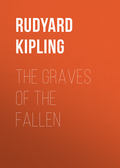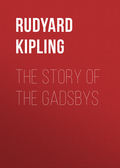
Редьярд Джозеф Киплинг
Actions and Reactions
“I was thinking more of the woods and the roads. I could double the value of the place in six months.”
“What do they want for it?” She shook her head, and her loosened hair fell glowingly about her cheeks.
“Seventy-five thousand dollars. They’ll take sixty-eight.”
“Less than half what we paid for our old yacht when we married. And we didn’t have a good time in her. You were – ”
“Well, I discovered I was too much of an American to be content to be a rich man’s son. You aren’t blaming me for that?”
“Oh, no. Only it was a very businesslike honeymoon. How far are you along with the deal, George?”
“I can mail the deposit on the purchase money to-morrow morning, and we can have the thing completed in a fortnight or three weeks – if you say so.”
“Friars Pardon – Friars Pardon!” Sophie chanted rapturously, her dark gray eyes big with delight. “All the farms? Gale Anstey, Burnt House, Rocketts, the Home Farm, and Griffons? Sure you’ve got ‘em all?”
“Sure.” He smiled.
“And the woods? High Pardons Wood, Lower Pardons, Suttons, Dutton’s Shaw, Reuben’s Ghyll, Maxey’s Ghyll, and both the Oak Hangers? Sure you’ve got ‘em all?”
“Every last stick. Why, you know them as well as I do.” He laughed. “They say there’s five thousand – a thousand pounds’ worth of lumber – timber they call it – in the Hangers alone.”
“Mrs. Cloke’s oven must be mended first thing, and the kitchen roof. I think I’ll have all this whitewashed,” Sophie broke in, pointing to the ceiling. “The whole place is a scandal. Lady Conant is quite right. George, when did you begin to fall in love with the house? In the greenroom that first day? I did.”
“I’m not in love with it. One must do something to mark time till one’s fit for work.”
“Or when we stood under the oaks, and the door opened? Oh! Ought I to go to poor Iggulden’s funeral?” She sighed with utter happiness.
“Wouldn’t they call it a liberty now?” said he.
“But I liked him.”
“But you didn’t own him at the date of his death.”
“That wouldn’t keep me away. Only, they made such a fuss about the watching” – she caught her breath – “it might be ostentatious from that point of view, too. Oh, George” – she reached for his hand – “we’re two little orphans moving in worlds not realized, and we shall make some bad breaks. But we’re going to have the time of our lives.”
“We’ll run up to London to-morrow, and see if we can hurry those English law solicitors. I want to get to work.”
They went. They suffered many things ere they returned across the fields in a fly one Saturday night, nursing a two by two-and-a-half box of deeds and maps – lawful owners of Friars Pardon and the five decayed farms therewith.
“I do most sincerely ‘ope and trust you’ll be ‘appy, Madam,” Mrs. Cloke gasped, when she was told the news by the kitchen fire.
“Goodness! It isn’t a marriage!” Sophie exclaimed, a little awed; for to them the joke, which to an American means work, was only just beginning.
“If it’s took in a proper spirit” – Mrs. Cloke’s eye turned toward her oven.
“Send and have that mended to-morrow,” Sophie whispered.
“We couldn’t ‘elp noticing,” said Cloke slowly, “from the times you walked there, that you an’ your lady was drawn to it, but – but I don’t know as we ever precisely thought – ” His wife’s glance checked him.
“That we were that sort of people,” said George. “We aren’t sure of it ourselves yet.”
“Perhaps,” said Cloke, rubbing his knees, “just for the sake of saying something, perhaps you’ll park it?”
“What’s that?” said George.
“Turn it all into a fine park like Violet Hill” – he jerked a thumb to westward – “that Mr. Sangres bought. It was four farms, and Mr. Sangres made a fine park of them, with a herd of faller deer.”
“Then it wouldn’t be Friars Pardon,” said Sophie. “Would it?”
“I don’t know as I’ve ever heard Pardons was ever anything but wheat an’ wool. Only some gentlemen say that parks are less trouble than tenants.” He laughed nervously. “But the gentry, o’ course, they keep on pretty much as they was used to.”
“I see,” said Sophie. “How did Mr. Sangres make his money?”
“I never rightly heard. It was pepper an’ spices, or it may ha’ been gloves. No. Gloves was Sir Reginald Liss at Marley End. Spices was Mr. Sangres. He’s a Brazilian gentleman – very sunburnt like.”
“Be sure o’ one thing. You won’t ‘ave any trouble,” said Mrs. Cloke, just before they went to bed.
Now the news of the purchase was told to Mr. and Mrs. Cloke alone at 8 P.M. of a Saturday. None left the farm till they set out for church next morning. Yet when they reached the church and were about to slip aside into their usual seats, a little beyond the font, where they could see the red-furred tails of the bellropes waggle and twist at ringing time, they were swept forward irresistibly, a Cloke on either flank (and yet they had not walked with the Clokes), upon the ever-retiring bosom of a black-gowned verger, who ushered them into a room of a pew at the head of the left aisle, under the pulpit.
“This,” he sighed reproachfully, “is the Pardons’ Pew,” and shut them in.
They could see little more than the choir boys in the chancel, but to the roots of the hair of their necks they felt the congregation behind mercilessly devouring them by look.
“When the wicked man turneth away.” The strong, alien voice of the priest vibrated under the hammer-beam roof, and a loneliness unfelt before swamped their hearts, as they searched for places in the unfamiliar Church of England service. The Lord’s Prayer “Our Father, which art” – set the seal on that desolation. Sophie found herself thinking how in other lands their purchase would long ere this have been discussed from every point of view in a dozen prints, forgetting that George for months had not been allowed to glance at those black and bellowing head-lines. Here was nothing but silence – not even hostility! The game was up to them; the other players hid their cards and waited. Suspense, she felt, was in the air, and when her sight cleared, saw, indeed, a mural tablet of a footless bird brooding upon the carven motto, “Wayte awhyle – wayte awhyle.”
At the Litany George had trouble with an unstable hassock, and drew the slip of carpet under the pewseat. Sophie pushed her end back also, and shut her eyes against a burning that felt like tears. When she opened them she was looking at her mother’s maiden name, fairly carved on a blue flagstone on the pew floor: Ellen Lashmar. ob. 1796. aetat 27.
She nudged George and pointed. Sheltered, as they kneeled, they looked for more knowledge, but the rest of the slab was blank.
“Ever hear of her?” he whispered.
“Never knew any of us came from here.”
“Coincidence?”
“Perhaps. But it makes me feel better,” and she smiled and winked away a tear on her lashes, and took his hand while they prayed for “all women labouring of child” – not “in the perils of childbirth”; and the sparrows who had found their way through the guards behind the glass windows chirped above the faded gilt and alabaster family tree of the Conants.
The baronet’s pew was on the right of the aisle. After service its inhabitants moved forth without haste, but so as to block effectively a dusky person with a large family who champed in their rear.
“Spices, I think,” said Sophie, deeply delighted as the Sangres closed up after the Conants. “Let ‘em get away, George.”
But when they came out many folk whose eyes were one still lingered by the lychgate.
“I want to see if any more Lashmars are buried here,” said Sophie.
“Not now. This seems to be show day. Come home quickly,” he replied.
A group of families, the Clokes a little apart, opened to let them through. The men saluted with jerky nods, the women with remnants of a curtsey. Only Iggulden’s son, his mother on his arm, lifted his hat as Sophie passed.
“Your people,” said the clear voice of Lady Conant in her ear.
“I suppose so,” said Sophie, blushing, for they were within two yards of her; but it was not a question.
“Then that child looks as if it were coming down with mumps. You ought to tell the mother she shouldn’t have brought it to church.”
“I can’t leave ‘er behind, my lady,” the woman said. “She’d set the ‘ouse afire in a minute, she’s that forward with the matches. Ain’t you, Maudie dear?”
“Has Dr. Dallas seen her?”
“Not yet, my lady.”
“He must. You can’t get away, of course. M-m! My idiotic maid is coming in for her teeth to-morrow at twelve. She shall pick her up – at Gale Anstey, isn’t it? – at eleven.”
“Yes. Thank you very much, my lady.”
“I oughtn’t to have done it,” said Lady Conant apologetically, “but there has been no one at Pardons for so long that you’ll forgive my poaching. Now, can’t you lunch with us? The vicar usually comes too. I don’t use the horses on a Sunday” – she glanced at the Brazilian’s silver-plated chariot. “It’s only a mile across the fields.”
“You – you’re very kind,” said Sophie, hating herself because her lip trembled.
“My dear,” the compelling tone dropped to a soothing gurgle, “d’you suppose I don’t know how it feels to come to a strange county – country I should say – away from one’s own people? When I first left the Shires – I’m Shropshire, you know – I cried for a day and a night. But fretting doesn’t make loneliness any better. Oh, here’s Dora. She did sprain her leg that day.”
“I’m as lame as a tree still,” said the tall maiden frankly. “You ought to go out with the otter-hounds, Mrs. Chapin. I believe they’re drawing your water next week.”
Sir Walter had already led off George, and the vicar came up on the other side of Sophie. There was no escaping the swift procession or the leisurely lunch, where talk came and went in low-voiced eddies that had the village for their centre. Sophie heard the vicar and Sir Walter address her husband lightly as Chapin! (She also remembered many women known in a previous life who habitually addressed their husbands as Mr. Such-an-one.) After lunch Lady Conant talked to her explicitly of maternity as that is achieved in cottages and farm-houses remote from aid, and of the duty thereto of the mistress of Pardons.
A gate in a beech hedge, reached across triple lawns, let them out before tea-time into the unkempt south side of their land.
“I want your hand, please,” said Sophie as soon as they were safe among the beech boles and the lawless hollies. “D’you remember the old maid in ‘Providence and the Guitar’ who heard the Commissary swear, and hardly reckoned herself a maiden lady afterward? Because I’m a relative of hers. Lady Conant is – ”
“Did you find out anything about the Lashmars?” he interrupted.
“I didn’t ask. I’m going to write to Aunt Sydney about it first. Oh, Lady Conant said something at lunch about their having bought some land from some Lashmars a few years ago. I found it was at the beginning of last century.”
“What did you say?”
“I said, ‘Really, how interesting!’ Like that. I’m not going to push myself forward. I’ve been hearing about Mr. Sangres’s efforts in that direction. And you? I couldn’t see you behind the flowers. Was it very deep water, dear?”
George mopped a brow already browned by outdoor exposures.
“Oh no – dead easy,” he answered. “I’ve bought Friars Pardon to prevent Sir Walter’s birds straying.”
A cock pheasant scuttered through the dry leaves and exploded almost under their feet. Sophie jumped.
“That’s one of ‘em,” said George calmly.
“Well, your nerves are better, at any rate,” said she. “Did you tell ‘em you’d bought the thing to play with?”
“No. That was where my nerve broke down. I only made one bad break – I think. I said I couldn’t see why hiring land to men to farm wasn’t as much a business proposition as anything else.”
“And what did they say?”
“They smiled. I shall know what that smile means some day. They don’t waste their smiles. D’you see that track by Gale Anstey?”
They looked down from the edge of the hanger over a cup-like hollow. People by twos and threes in their Sunday best filed slowly along the paths that connected farm to farm.
“I’ve never seen so many on our land before,” said Sophie. “Why is it?”
“To show us we mustn’t shut up their rights of way.”
“Those cow-tracks we’ve been using cross lots?” said Sophie forcibly.
“Yes. Any one of ‘em would cost us two thousand pounds each in legal expenses to close.”
“But we don’t want to,” she said.
“The whole community would fight if we did.”
“But it’s our land. We can do what we like.”
“It’s not our land. We’ve only paid for it. We belong to it, and it belongs to the people – our people they call ‘em. I’ve been to lunch with the English too.”
They passed slowly from one bracken-dotted field to the next – flushed with pride of ownership, plotting alterations and restorations at each turn; halting in their tracks to argue, spreading apart to embrace two views at once, or closing in to consider one. Couples moved out of their way, but smiling covertly.
“We shall make some bad breaks,” he said at last.
“Together, though. You won’t let anyone else in, will you?”
“Except the contractors. This syndicate handles, this proposition by its little lone.”
“But you might feel the want of some one,” she insisted.
“I shall – but it will be you. It’s business, Sophie, but it’s going to be good fun.”
“Please God,” she answered flushing, and cried to herself as they went back to tea. “It’s worth it. Oh, it’s worth it.”
The repairing and moving into Friars Pardon was business of the most varied and searching, but all done English fashion, without friction. Time and money alone were asked. The rest lay in the hands of beneficent advisers from London, or spirits, male and female, called up by Mr. and Mrs. Cloke from the wastes of the farms. In the centre stood George and Sophie, a little aghast, their interests reaching out on every side.
“I ain’t sayin’ anything against Londoners,” said Cloke, self-appointed clerk of the outer works, consulting engineer, head of the immigration bureau, and superintendent of woods and forests; “but your own people won’t go about to make more than a fair profit out of you.”
“How is one to know?” said George.
“Five years from now, or so on, maybe, you’ll be lookin’ over your first year’s accounts, and, knowin’ what you’ll know then, you’ll say: ‘Well, Billy Beartup’ – or Old Cloke as it might be – ‘did me proper when I was new.’ No man likes to have that sort of thing laid up against him.”
“I think I see,” said George. “But five years is a long time to look ahead.”
“I doubt if that oak Billy Beartup throwed in Reuben’s Ghyll will be fit for her drawin-room floor in less than seven,” Cloke drawled.
“Yes, that’s my work,” said Sophie. (Billy Beartup of Griffons, a woodman by training and birth, a tenant farmer by misfortune of marriage, had laid his broad axe at her feet a month before.) “Sorry if I’ve committed you to another eternity.”
“And we shan’t even know where we’ve gone wrong with your new carriage drive before that time either,” said Cloke, ever anxious to keep the balance true with an ounce or two in Sophie’s favour. The past four months had taught George better than to reply. The carriage road winding up the hill was his present keen interest. They set off to look at it, and the imported American scraper which had blighted the none too sunny soul of “Skim” Winsh, the carter.
But young Iggulden was in charge now, and under his guidance, Buller and Roberts, the great horses, moved mountains.
“You lif’ her like that, an’ you tip her like that,” he explained to the gang. “My uncle he was roadmaster in Connecticut.”
“Are they roads yonder?” said Skim, sitting under the laurels.
“No better than accommodation roads. Dirt, they call ‘em. They’d suit you, Skim.”
“Why?” said the incautious Skim.
“Cause you’d take no hurt when you fall out of your cart drunk on a Saturday,” was the answer.
“I didn’t last time neither,” Skim roared.
After the loud laugh, old Whybarne of Gale Anstey piped feebly, “Well, dirt or no dirt, there’s no denyin’ Chapin knows a good job when he sees it. ‘E don’t build one day and dee-stroy the next, like that nigger Sangres.”
“SHE’s the one that knows her own mind,” said Pinky, brother to Skim Winsh, and a Napoleon among carters who had helped to bring the grand piano across the fields in the autumn rains.
“She had ought to,” said Iggulden. “Whoa, Buller! She’s a Lashmar. They never was double-thinking.”
“Oh, you found that? Has the answer come from your uncle?” said Skim, doubtful whether so remote a land as America had posts.
The others looked at him scornfully. Skim was always a day behind the fair. Iggulden rested from his labours. “She’s a Lashmar right enough. I started up to write to my uncle – at once – the month after she said her folks came from Veering Holler.”
“Where there ain’t any roads?” Skim interrupted, but none laughed.
“My uncle he married an American woman for his second, and she took it up like a like the coroner. She’s a Lashmar out of the old Lashmar place, ‘fore they sold to Conants. She ain’t no Toot Hill Lashmar, nor any o’ the Crayford lot. Her folk come out of the ground here, neither chalk nor forest, but wildishers. They sailed over to America – I’ve got it all writ down by my uncle’s woman – in eighteen hundred an’ nothing. My uncle says they’re all slow begetters like.”
“Would they be gentry yonder now?” Skim asked.
“Nah – there’s no gentry in America, no matter how long you’re there. It’s against their law. There’s only rich and poor allowed. They’ve been lawyers and such like over yonder for a hundred years but she’s a Lashmar for all that.”
“Lord! What’s a hundred years?” said Whybarne, who had seen seventy-eight of them.
“An’ they write too, from yonder – my uncle’s woman writes – that you can still tell ‘em by headmark. Their hair’s foxy-red still – an’ they throw out when they walk. He’s in-toed-treads like a gipsy; but you watch, an’ you’ll see ‘er throw, out – like a colt.”
“Your trace wants taking up.” Pinky’s large ears had caught the sound of voices, and as the two broke through the laurels the men were hard at work, their eyes on Sophie’s feet.
She had been less fortunate in her inquiries than Iggulden, for her Aunt Sydney of Meriden (a badged and certificated Daughter of the Revolution to boot) answered her inquiries with a two-paged discourse on patriotism, the leaflets of a Village Improvement Society, of which she was president, and a demand for an overdue subscription to a Factory Girls’ Reading Circle. Sophie burned it all in the Orpheus and Eurydice grate, and kept her own counsel.
“What I want to know,” said George, when Spring was coming, and the gardens needed thought, “is who will ever pay me for my labour? I’ve put in at least half a million dollars’ worth already.”
“Sure you’re not taking too much out of yourself?” his wife asked.
“Oh, no; I haven’t been conscious of myself all winter.” He looked at his brown English gaiters and smiled. “It’s all behind me now. I believe I could sit down and think of all that – those months before we sailed.”
“Don’t – ah, don’t!” she cried.
“But I must go back one day. You don’t want to keep me out of business always – or do you?” He ended with a nervous laugh.
Sophie sighed as she drew her own ground-ash (of old Iggulden’s cutting) from the hall rack.
“Aren’t you overdoing it too? You look a little tired,” he said.
“You make me tired. I’m going to Rocketts to see Mrs. Cloke about Mary.” (This was the sister of the telegraphist, promoted to be sewing-maid at Pardons.) “Coming?”
“I’m due at Burnt House to see about the new well. By the way, there’s a sore throat at Gale Anstey – ”
“That’s my province. Don’t interfere. The Whybarne children always have sore throats. They do it for jujubes.”
“Keep away from Gale Anstey till I make sure, honey. Cloke ought to have told me.”
“These people don’t tell. Haven’t you learnt that yet? But I’ll obey, me lord. See you later!”
She set off afoot, for within the three main roads that bounded the blunt triangle of the estate (even by night one could scarcely hear the carts on them), wheels were not used except for farm work. The footpaths served all other purposes. And though at first they had planned improvements, they had soon fallen in with the customs of their hidden kingdom, and moved about the soft-footed ways by woodland, hedgerow, and shaw as freely as the rabbits. Indeed, for the most part Sophie walked bareheaded beneath her helmet of chestnut hair; but she had been plagued of late by vague toothaches, which she explained to Mrs. Cloke, who asked some questions. How it came about Sophie never knew, but after a while behold Mrs. Cloke’s arm was about her waist, and her head was on that deep bosom behind the shut kitchen door.
“My dear! My dear!” the elder woman almost sobbed. “An’ d’you mean to tell me you never suspicioned? Why – why – where was you ever taught anything at all? Of course it is. It’s what we’ve been only waitin’ for, all of us. Time and again I’ve said to Lady – ” she checked herself. “An’ now we shall be as we should be.”
“But – but – but – ” Sophie whimpered.
“An’ to see you buildin’ your nest so busy – pianos and books – an’ never thinkin’ of a nursery!”
“No more I did.” Sophie sat bolt upright, and began to laugh.
“Time enough yet.” The fingers tapped thoughtfully on the broad knee. “But – they must be strange-minded folk over yonder with you! Have you thought to send for your mother? She dead? My dear, my dear! Never mind! She’ll be happy where she knows. ‘Tis God’s work. An’ we was only waitin’ for it, for you’ve never failed in your duty yet. It ain’t your way. What did you say about my Mary’s doings?” Mrs. Cloke’s face hardened as she pressed her chin on Sophie’s forehead. “If any of your girls thinks to be’ave arbitrary now, I’ll – But they won’t, my dear. I’ll see they do their duty too. Be sure you’ll ‘ave no trouble.”
When Sophie walked back across the fields heaven and earth changed about her as on the day of old Iggulden’s death. For an instant she thought of the wide turn of the staircase, and the new ivory-white paint that no coffin corner could scar, but presently, the shadow passed in a pure wonder and bewilderment that made her reel. She leaned against one of their new gates and looked over their lands for some other stay.
“Well,” she said resignedly, half aloud, “we must try to make him feel that he isn’t a third in our party,” and turned the corner that looked over Friars Pardon, giddy, sick, and faint.
Of a sudden the house they had bought for a whim stood up as she had never seen it before, low-fronted, broad-winged, ample, prepared by course of generations for all such things. As it had steadied her when it lay desolate, so now that it had meaning from their few months of life within, it soothed and promised good. She went alone and quickly into the hall, and kissed either door-post, whispering: “Be good to me. You know! You’ve never failed in your duty yet.”
When the matter was explained to George, he would have sailed at once to their own land, but this Sophie forbade.
“I don’t want science,” she said. “I just want to be loved, and there isn’t time for that at home. Besides,” she added, looking out of the window, “it would be desertion.”
George was forced to soothe himself with linking Friars Pardon to the telegraph system of Great Britain by telephone – three-quarters of a mile of poles, put in by Whybarne and a few friends. One of these was a foreigner from the next parish. Said he when the line was being run: “There’s an old ellum right in our road. Shall us throw her?”
“Toot Hill parish folk, neither grace nor good luck, God help ‘em.” Old Whybarne shouted the local proverb from three poles down the line. “We ain’t goin’ to lay any axe-iron to coffin-wood here not till we know where we are yet awhile. Swing round ‘er, swing round!”
To this day, then, that sudden kink in the straight line across the upper pasture remains a mystery to Sophie and George. Nor can they tell why Skim Winsh, who came to his cottage under Dutton Shaw most musically drunk at 10.45 P.M of every Saturday night, as his father had done before him, sang no more at the bottom of the garden steps, where Sophie always feared he would break his neck. The path was undoubtedly an ancient right of way, and at 10.45 P.M. on Saturdays Skim remembered it was his duty to posterity to keep it open – till Mrs. Cloke spoke to him once. She spoke likewise to her daughter Mary, sewing maid at Pardons, and to Mary’s best new friend, the five-foot-seven imported London house-maid, who taught Mary to trim hats, and found the country dullish.
But there was no noise – at no time was there any noise – and when Sophie walked abroad she met no one in her path unless she had signified a wish that way. Then they appeared to protest that all was well with them and their children, their chickens, their roofs, their water-supply, and their sons in the police or the railway service.
“But don’t you find it dull, dear?” said George, loyally doing his best not to worry as the months went by.
“I’ve been so busy putting my house in order I haven’t had time to think,” said she. “Do you?”
“No – no. If I could only be sure of you.”
She turned on the green drawing-room’s couch (it was Empire, not Heppelwhite after all), and laid aside a list of linen and blankets.
“It has changed everything, hasn’t it?” she whispered.
“Oh, Lord, yes. But I still think if we went back to Baltimore – ”
“And missed our first real summer together. No thank you, me lord.”
“But we’re absolutely alone.”
“Isn’t that what I’m doing my best to remedy? Don’t you worry. I like it – like it to the marrow of my little bones. You don’t realize what her house means to a woman. We thought we were living in it last year, but we hadn’t begun to. Don’t you rejoice in your study, George?”
“I prefer being here with you.” He sat down on the floor by the couch and took her hand.
“Seven,” she said, as the French clock struck. “Year before last you’d just be coming back from business.”
He winced at the recollection, then laughed. “Business! I’ve been at work ten solid hours to-day.”
“Where did you lunch? With the Conants?”
“No; at Dutton Shaw, sitting on a log, with my feet in a swamp. But we’ve found out where the old spring is, and we’re going to pipe it down to Gale Anstey next year.”
“I’ll come and see to-morrow. Oh, please open the door, dear. I want to look down the passage. Isn’t that corner by the stair-head lovely where the sun strikes in?” She looked through half-closed eyes at the vista of ivory-white and pale green all steeped in liquid gold.
“There’s a step out of Jane Elphick’s bedroom,” she went on – “and his first step in the world ought to be up. I shouldn’t wonder if those people hadn’t put it there on purpose. George, will it make any odds to you if he’s a girl?”
He answered, as he had many times before, that his interest was his wife, not the child.
“Then you’re the only person who thinks so.” She laughed. “Don’t be silly, dear. It’s expected. I know. It’s my duty. I shan’t be able to look our people in the face if I fail.”
“What concern is it of theirs, confound ‘em!”
“You’ll see. Luckily the tradition of the house is boys, Mrs. Cloke says, so I’m provided for. Shall you ever begin to understand these people? I shan’t.”
“And we bought it for fun – for fun!” he groaned. “And here we are held up for goodness knows how long!”
“Why? Were you thinking of selling it?” He did not answer. “Do you remember the second Mrs. Chapin?” she demanded.
This was a bold, brazen little black-browed woman – a widow for choice – who on Sophie’s death was guilefully to marry George for his wealth and ruin him in a year. George being busy, Sophie had invented her some two years after her marriage, and conceived she was alone among wives in so doing.
“You aren’t going to bring her up again?” he asked anxiously.
“I only want to say that I should hate any one who bought Pardons ten times worse than I used to hate the second Mrs. Chapin. Think what we’ve put into it of our two selves.”
“At least a couple of million dollars. I know I could have made – ” He broke off.
“The beasts!” she went on. “They’d be sure to build a red-brick lodge at the gates, and cut the lawn up for bedding out. You must leave instructions in your will that he’s never to do that, George, won’t you?”
He laughed and took her hand again but said nothing till it was time to dress. Then he muttered “What the devil use is a man’s country to him when he can’t do business in it?”
Friars Pardon stood faithful to its tradition. At the appointed time was born, not that third in their party to whom Sophie meant to be so kind, but a godling; in beauty, it was manifest, excelling Eros, as in wisdom Confucius; an enhancer of delights, a renewer of companionships and an interpreter of Destiny. This last George did not realise till he met Lady Conant striding through Dutton Shaw a few days after the event.
“My dear fellow,” she cried, and slapped him heartily on the back, “I can’t tell you how glad we all are. Oh, she’ll be all right. (There’s never been any trouble over the birth of an heir at Pardons.) Now where the dooce is it?” She felt largely in her leather-boundskirt and drew out a small silver mug. “I sent a note to your wife about it, but my silly ass of a groom forgot to take this. You can save me a tramp. Give her my love.” She marched off amid her guard of grave Airedales.
The mug was worn and dented: above the twined initials, G.L., was the crest of a footless bird and the motto: “Wayte awhyle – wayte awhyle.”
“That’s the other end of the riddle,” Sophie whispered, when he saw her that evening. “Read her note. The English write beautiful notes.”
The warmest of welcomes to your little man. I hope he will appreciate his native land now he has come to it. Though you have said nothing we cannot, of course, look on him as a little stranger, and so I am sending him the old Lashmar christening mug. It has been with us since Gregory Lashmar, your great-grandmother’s brother —
George stared at his wife.
“Go on,” she twinkled, from the pillows.







